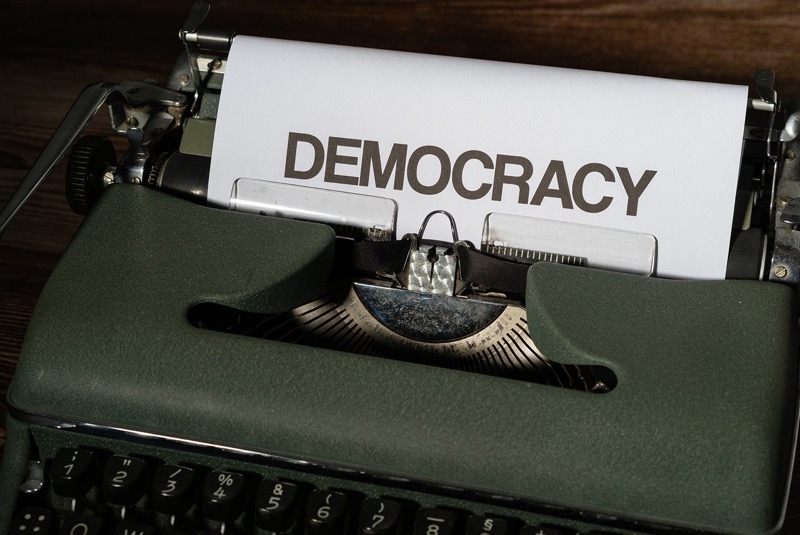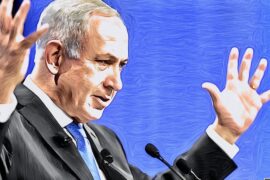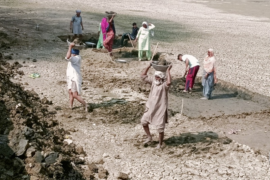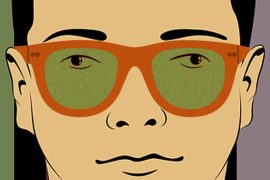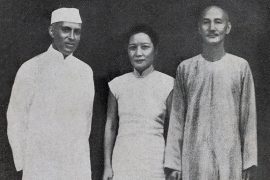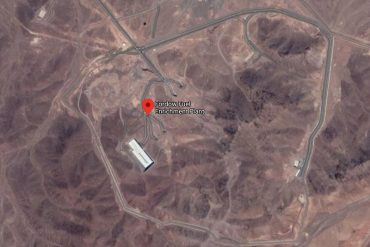Plato, the Greek philosopher, had utter disdain for democracy. He contended that late-stage democracies, which contain the seeds of tyranny, degenerate into an authoritarian yoke when the time is ripe.
Plato’s discourse on democracy appears in his magnum opus, The Republic; in books eight and nine, he elucidates the sequence in which egalitarian social systems retrograde into tyrannical oppression.
Interestingly, other great political analysts and philosophers such as Polybius, Aristotle, Machiavelli and John Adams did not refute Plato’s treatise on the irredeemable fate of democracies. However, modern-day academics, public intellectuals and political strategists dismiss Plato as ‘a genius political philosopher but a shoddy political scientist.’
Plato wrote The Republic in BCE 375. But it seems that 2400 years later, Plato has been proven right. In the twenty-first century—marked by technological advancements and the unprecedented proliferation of knowledge societies in human history—democracies of the world are turning into autocracies.
V-Dem, a ‘research group’ based at the University of Gothenburg, which monitors and analyses the quality of democracies worldwide, states in a 2021 report that more than seventy per cent of the world’s population live in autocracies—a significant increase from forty-nine per cent in 2011.
Between 2011 and 2021, thirty-three countries, representing thirty-six per cent of the world’s population, have turned into autocracies. Six of the twenty-seven member states in the European Union have turned into autocracies.
In 2021 alone, there were six successful coups, a sharp point of departure from the global average of 1.2 coups per year since 2000. It indicates the vulnerability of democracies by virtue of the inefficiencies and growing inequalities.
The idea of democracy has faced manifold challenges ever since it was conceived as a system for organising and governing nations. For instance, dynastic monarchies were the main detriment to liberal democracies during the First World War in Ottoman and Prussian Empires; during the Second World War, it was the rise of Fascism, spearheaded by Nazi Germany, Italy, Japan and its Axis Powers coalition.
The Cold War era, led by the United States and the USSR, divided the world into a bipolar world order. With the fall of the Berlin Wall and the disintegration of the Soviet Union, the stage for liberal democracies was set.
Commending the dawn of liberal democracies, the American political scientist Francis Fukuyama argued that sociocultural revolutions and political struggles that buffeted history for millennia would end. He predicted that globalisation, neoliberal economic policies, free market capitalism, and an egalitarian social order would lay the foundations of liberal democracies worldwide.
In the 1990s, ‘liberal democracy’ as the dominant socio-economic world order seemed an achievable and desirable goal. This was accentuated by the integration of global economies, falling barriers to trade, amelioration of global poverty and levelling-up of incomes due to the internationalisation of production.
A single-party authoritarian state like China, which opened itself to global markets and multinational corporations, was presented as the poster boy of economic liberalisation. Indeed, Chinese capitalism, euphemistically called ‘Socialism with Chinese characteristics,’ lifted millions of Chinese people from abject poverty and transformed the country into an economic powerhouse. However, the nation remained an illiberal command and control state, limiting and thwarting free speech and expression and eschewing property rights.
In his famous Gettysburg Address, Abraham Lincoln said democracy, the ‘Government of the people, by the people, and for the people, shall not perish from the earth.’ Lincoln’s statement is overarching; perhaps he suffered from oversight of the excesses lurking within democracies that could potentially lead to their demise.
Democracy, like other systems, is beset with inherent inefficiencies that devour its principles of equality, autonomy, freedom and individual rights. As a consequence, inequality becomes widespread, cronyism and nepotism become pervasive, criminals are exonerated, and innocents are incarcerated, the rich and the powerful conspire to appropriate national resources, and the government is singularly focused on clutching to power through realpolitik manoeuvres and condoning fissiparous forces.
Propaganda replaces the truth, and the common man is left in the lurch. Disgruntled and robbed of his future, he awaits a messiah to deliver him from the inexorable clutches of misery. The media—touted as the fourth pillar of democracy—colludes to advance the interests of the incumbent government by subverting democratic ideals and constitutional guarantees, exacerbating the disillusionment among the masses.
Professor Noam Chomsky, one of the world’s foremost public intellectuals, narrates how democratic governments limit democratic discourse in the public sphere. He writes: ‘The smart way to keep people passive and obedient is to strictly limit the spectrum of acceptable opinion, but allow very lively debate within that spectrum.’ Both Joesph Goebbels and Josef Stalin liked to allow freedom of speech only for the ideas they liked.
Such disparities allow crafty demagogues with despotic instincts to grab power either through armed revolutions or coup d’etat. Examples of successful coups in modern history are aplenty: Francisco Franco, known as ‘El Caudillo,’ seized power in Spain; Muammar al-Quaddafi overthrew King Edris in Libya, Idi Amin, the self-proclaimed ‘Last King of Scotland,’ toppled President Milton Obote in Uganda and Augusto Pinochet, backed by the CIA, ousted President Salvador Allende of Chile.
These men masqueraded as ‘friends of the people’ and champions of reform and ruled these countries with an iron fist. They professed equality and had an avid supporter base—a mob who offered blind allegiance to their ideologies. However, their regimes gained notoriety for their oppressive, authoritarian rule.
Democracies retrograde into autocracies through elections, too. In 1932, the Nazis occupied the Reichstag with sixty per cent votes in the parliamentary elections by underscoring a majoritarian ethno-nationalist agenda. They proposed the Aryan Supremacy Theory of German racial purity, which singled out unpopular minorities like Jews and Romas, who were obliterated in concentration camps.
Also witch-hunted were the nobility, the rich, intellectuals, artists, clergy and the communists; added to that is the notorious Aktion T4 program targeting people with physical and mental disabilities. Public intellectuals and politicians who read Hitler’s autobiography, ‘Mein Kampf,‘ where his plans to obliterate the Jews were explicit, never raised alarm; they are culpable of the Holocaust. When identity politics reign supreme, humanitarian values disappear from the moral universe.
India’s Narendra Modi, who assumed power as Prime Minister for the third term, was on a path towards authoritarianism. He intended to decimate the opposition, but the practical engine of a self-correcting electorate humbled him. Lies, disinformation, bigotry and appeals to cultural and ethnonationalism were his prime manifesto during the election campaigns, unbecoming for a prime ministerial candidate in post-independence India. But the dismal economic performance and centralised governance backfired on him.
The Russian President, Vladimir Putin, is a quintessential candidate for strongman politics. His regime is a classic example of a democracy backsliding into autocracy. A former KGB agent, Putin was promoted by former president Boris Yeltsin to continue with market reforms by projecting his image as a liberal and democrat. Putin’s popularity soared with the Second Chechen War, in which the predominantly Muslim region was annexed back from the separatists.
Over the years, he consolidated power by destroying the opposition, warping media, silencing critics, and preventing the separation of powers between the legislative, executive, and judiciary. He spearheaded the anti-democratic transformation across Europe and Eurasia and used military force in Georgia in 2008 and in Ukraine to oust a democratically elected sovereign republic.
Ukraine’s pro-western economic orientation, focus on market reforms, and FDI’s inclination to join NATO irked the Russian president, primarily for fear of Russians demanding the same reforms from his administration.
Autocrats fear liberalism and abhor free speech. When authoritarian rulers in Belarus and Kazakhstan succumbed to popular demands for change, Putin backstopped their regimes and deepened their dependence on Moscow through deft political and economic overtures.
Viktor Orban, Hungary’s Prime Minister, exemplifies another trend: hybrid regimes or Nations in Transition, which are democratic in structure but autocratic in execution. His Fidesz party conducts parliamentary elections that are rigged by pressing into service the sycophantic media and servile state apparatus against the opposition.
President Aleksandr Vucic of Serbia has followed Orban’s footsteps, and his Serbian Progressive Party (SNS) has swept the parliamentary elections in 2020 amidst widespread allegations of electoral fraud and irregularities.
Both these leaders have taken a leaf out of the playbook of former President Milo Dukanovic of Montenegro and erstwhile Prime Minister Nikola Gruevski of North Macedonia, having indulged in undemocratic practices of bribing voters, wiretapping opponents, nexus with organised crime, and eschewing transparency and accountability in polity.
Immanuel Kant, the influential German philosopher, expressed his scepticism of democracy. In his book Perpetual Peace: A Philosophical Sketch, he wrote:
Democracy is, properly speaking, necessarily a despotism, because it establishes an executive power in which all decide for or even against one who does not agree; that is, all, who are not quite all, decide, and this is a contradiction of the general will with itself and with freedom.
The rise of China—a revisionist, single-party state—into the upper echelons of global economic power incentivises authoritarian rulers in democratic and hybrid regimes to transition into autocracy. China engages in ‘Infrastructure Diplomacy‘ around the globe, especially in African countries. For its brutal and illiberal regime, ‘democracy prevention’ and making the world an autocracy is at the heart of Chinese foreign policy today.
Nations are in transition, and so is the fate of democracies worldwide. Even in vibrant democracies like the US, the citadels of democratic ideals are crashing in the waves of polarisation. Liberal democracies could be saved only through concerted efforts to promote democracy.
-30-
Copyright©Madras Courier, All Rights Reserved. You may share using our article tools. Please don't cut articles from madrascourier.com and redistribute by email, post to the web, mobile phone or social media.Please send in your feed back and comments to [email protected]

